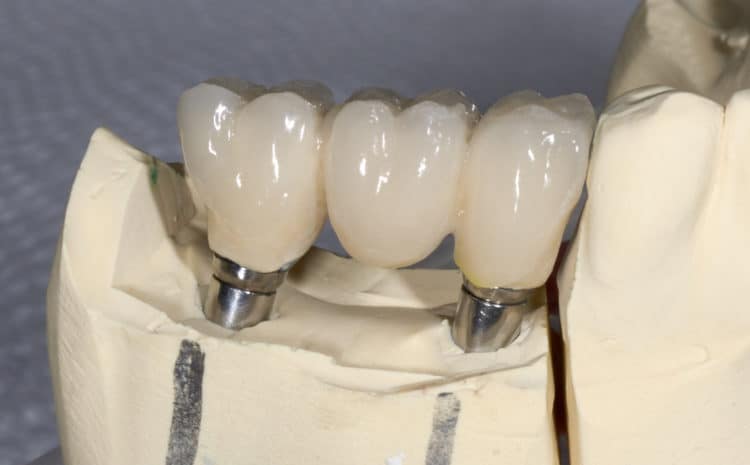
Inside the lab: Crafting Dental Implants with Precision
Restoring your missing teeth with dental implant crowns will provide you with the desired smile makeover. Previously, patients had only two choices for replacing missing teeth: dental bridges or dentures. Implants and implant-supported bridges are two of the most reliable and effective dental implant crown options available today.
What are the components of dental implant crown restorations?
Implant-supported restorations are made up of three major components –
- Dental implant: The screw that holds the reconstruction in place may be a crown or bridge.
- Implant abutment: The center of the implant that connects the screw and the implant crown or fixed implant bridge.
- Restoration: Either the crown or a portion of the bridge completes the implant and resembles a tooth.
What are the Implant-Supported Bridges or Dental Implant Crowns?
Implant crowns and bridges are provided by implants that are placed in your mouth to replace missing teeth. The implant resembles a screw. We position it in your jaw for maximum support. The implant anchors a dental crown.
Patients that need several tooth replacements can be eligible for implant-supported bridges. Depending on its length, the bridge can accommodate three to ten teeth.
When a patient is missing all of his or her teeth, they might require a full-mouth restoration. Implant-supported dentures may be used for the replacement of missing teeth. Our implants appear entirely normal, and no one can believe they are not your natural teeth.
What are the Types of Dental Implants Crowns?
There are two types of dental implant crowns available. Both are beneficial to patients.
- Screw-retained implant crown
They are the first kind. The screw connects the dental implant abutment to the implant crown, which has a small gap. The dentist uses a matching bonding material to seal the hole.
The most significant advantage of a screw-retained implant crown and implant bridge is that if an implant abutment becomes loose, the dentist may remove the implant crown or implant bridge without causing any harm. Dentists prefer screw-retained implant bridges as multiple teeth can be replaced.
- Implant crowns with cement retention
Cement-retained implant crowns have the same components as screw-retained implant crowns. They are distinguished by the use of cement to attach the cement-retained implant crowns to the implant abutment. This form of the crown has no gap. Dentists will have trouble extracting a loose crown and may need to drill a hole in it.
Dentists do not prescribe cement-retained implant crowns when a patient requires a sizeable restorative dentistry bridge.
What are the Pros and Cons of Different Types of Dental Implants?
In dental implantology, the most widely used restoration is cementation. Advantages include coverage for poorly inclined implants, smoother passive fit due to the cement layer between the abutment and reconstruction, the absence of a screw access opening, resulting in the presence of an intact occlusal table, and easier occlusion control. However, one significant drawback is the difficulty of clearing excess cement for cement-retained implants. Excess cement is linked to the growth of peri-implant mucositis and peri-implantitis.
Screw-retained restorations, on the other hand, provide more predictable retrievability. They need less interocclusal space and easy to clean or for necessary repairs. Furthermore, angulated screw channel solutions have made screw-retained restorations feasible for the restoration of complex cases too.
When is the screw-retained dental implant recommended?
A screw-retained dental implant is recommended in the following situations –
- There is a limited amount of space between the arches (interarch) (minimum 4 mm.)
- In the case of cantilever-style fixed prostheses.
- For fixed prostheses with a long duration.
- For temporization of implants in the esthetic zone to enable soft tissue conditioning and finalize the emergence and mucosal profile.
- When it is essential to be able to retrieve a component.
How to determine the best type of dental implant for me?
The clinician is responsible for determining the best form of retention for dental implants for each case. Esthetics, retention, bone preservation, and resistance are the four factors that play an essential role in determining the type of dental implant.
Looking for the best dental implant crowns in Lakeland, TN?
Dr. Adatrow can help!
If you have any further questions about oral health, you can schedule a consultation with Dr. Adatrow. Dr. Adatrow has more than 18 years of experience in placing dental implants, with a success rate of over 97%, and can provide you with the best possible dental treatment. He is a Board-Certified Prosthodontist and Periodontist. Please contact our office to schedule your consultation now!
About Advanced Dental Implant and TMJ Center
Advanced Dental Implant and TMJ Center provides personalized and specialized dental treatment for patients in Desoto County, MS and Memphis, TN areas. Dr. Pradeep Adatrow is Specialist in Dental Implants and Gum Diseases and provides patients with customized treatment plans to meet the oral health needs of his patients. Dr. Adatrow is the only practicing board-certified Periodontist and Prosthodontist in the South East United States. He earned his Doctor of Dental Surgery and Post Graduate Prosthodontic Training from the University of Tennessee College of Dentistry and his Post Graduate Training in Periodontics from Indiana University. Dr. Adatrow is board certified by the American Board of Periodontology and is a Fellow of the prestigious International College of Dentistry. Along with a devoted team of dental hygienists, assistants, and administrative staff, we strive for excellence in customer satisfaction. Please visit our website at www.advanceddentaltmj.com or call us at (662) 655-4868 to schedule a consultation.



